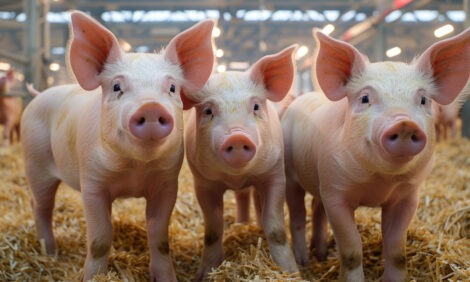



Supervising Farrowing Could Pay Off
Farmers can benefit from higher survival rates and better immunity, says Arthur Churchyard in the monthly Ontario Pork Newsletter.An estimated five million pigs die every year on Canadian farms. That’s a tremendous loss of life, resources and profits. But many of these deaths can be prevented through closer supervision, say Guelph animal scientists. They’re studying the effects of active supervision throughout birth and weaning on the survival and immunity levels of newborn pigs. Prof. Robert Friendship and graduate student Khanh Nguyen, Department of Population Medicine, are looking at the benefits of inducing pregnant sows, and supervising farrowing. They’re finding that being prepared and actively involved to help sows through birthing and weaning could improve piglet health.
“You can potentially save a large number of pigs just by supervising them for the first three days,” says Nguyen. “The improvements in farm productivity and animal welfare are worth every minute of extra care.” The best way to predict when a sow will start birthing is to look at her past gestation record. This record would show the number of days to term in past gestations, which would be a strong indicator of when to induce the sow in her current term.
When piglets are born, hypothermia, crushing, starvation, trauma, and sickness can occur. To prevent these maladies and losses, Nguyen says helping with farrowing and moving newborn pigs to safety is a good idea. She says it can also be an opportune time to clear the pigs’ airways, dry them off, and place them in a crèche (a large tub with a heat source) to prevent crushing by the sow. Then, once the sow has settled, Nguyen says the piglets can be guided to the sow to start suckling.
In the study, Nguyen found feeding time could be pivotal in ensuring balanced immunity is built-up in all the newborns. Because of large litter sizes, pigs that are born first can get the unfair advantage of drinking more and blocking a teat for latecomers. The research team is now studying the effect of this and the potential to create immune variability between pigs. Nguyen says she and Friendship found it may be possible that among pigs with uneven immunity levels there could be what she calls a ‘Trojan pig’.
This Trojan could have a lower immunity causing it to become infected with viruses such as porcine reproductive and respiratory syndrome (PRRS), and then carry this sickness into the nursery. As passive immunity is lost, other pigs become infected. She says this Trojan pig has the potential to spread disease and cause devastating losses in the herd.
Evening the odds for pigs by supervising suckling could help to eliminate immune variability, say Nguyen, with the end result being dependable herds that survive diseases as a whole. She says ensuring pigs get enough colostrum during the first few hours after birth is crucial to boost immunity and fight numerous diseases including PRRS and porcine circovirus infection. She’s found strategies that help guide weaker pigs to a teat and actively feeding piglets colostrum if they are small and weak.
In continued research, the team is analyzing blood samples to better understand and compare immune systems of supervised versus unsupervised pigs. Funding for this research was provided by the University of Guelph – OMAFRA sustainable production systems research program and Pfizer Canada.
January 2007
Arthur Churchyard is a writer with SPARK, the University of Guelph's student writing program.









